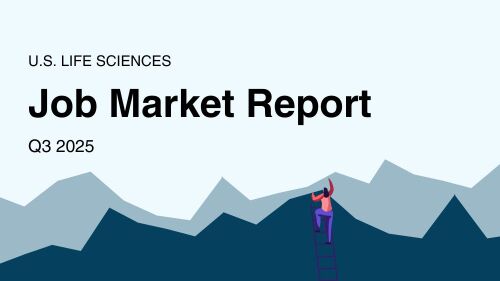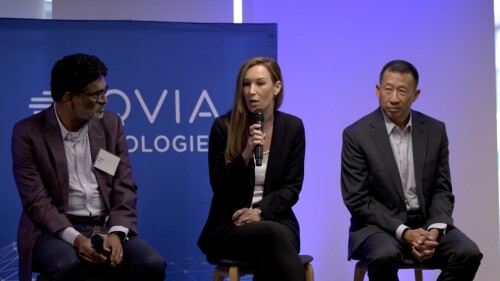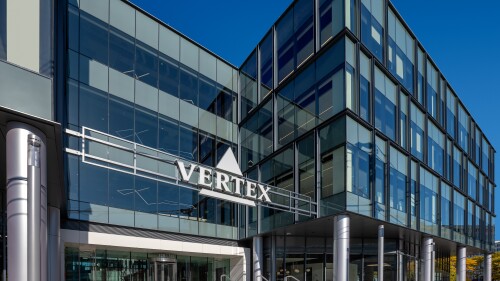In its first commercial quarter for ATTR-cardiomyopathy, Alnylam’s Amvuttra reached roughly 1,400 patients and made more than $490 million.
Merck has characterized its cost-cutting initiative as more of a reallocation of resources to support other, higher-growth areas of its business.
In 17 identical letters posted to his Truth Social account, the president said companies must lower their prices or the government ‘will deploy every tool in our arsenal to protect American families from continued drug pricing practices.’
The FDA greenlit multiple new drugs this month and issued some notable label expansions, including for Eli Lilly’s Kisunla. Meanwhile, the regulator turned away a cell therapy for Duchenne muscular dystrophy and a gene therapy for the rare disease Sanfilippo syndrome.
Bristol Myers Squibb tested Cobenfy as an adjunctive treatment with atypical antipsychotics for schizophrenia in the Phase III ARISE study, which earlier this year failed to demonstrate significant symptom improvement.
For now, Sanofi’s U.S. inventory is insulating the company from a potential 15% tariff on drugs shipped from the EU.
FEATURED STORIES
The BIOSECURE Act’s prohibition on doing business with China-based companies may have implications for biotech and biopharma markets on both sides of the Pacific.
After a long and challenging journey for its stem cell therapy NurOwn, BrainStorm Cell Therapeutics has aligned with the FDA on the parameters of a Phase IIIb ALS trial that is expected to begin by the end of 2024.
With GLP-1 receptor agonists expected to dominate the weight loss market in the near term, several young companies are building on this mechanism, while others are taking a completely different approach.
While type 2 diabetes and obesity are the primary conditions currently treated with blockbuster GLP-1 drugs, Novo Nordisk and Eli Lilly aim to enter additional markets.
As the yearslong litigation over ownership of CRISPR gene editing continues, investors have forged ahead with funding the technology’s development by biopharma.
Pfizer selects its candidate for the oral GLP-1 race as Eli Lilly strives to overtake Novo Nordisk in the injectable weight-loss drug space. Meanwhile, pressure builds to reduce drug prices in the U.S.
LATEST PODCASTS
Pfizer seals the deal with Metsera for $10 billion after Novo Nordisk bowed out; President Donald Trump welcomes executives from Novo and Eli Lilly to the White House to announce that the companies’ GLP-1 medicines would be sold at a reduced cost; and the FDA grants the second round of priority review vouchers—primarily to already marketed drugs.
In this episode presented by PII, BioSpace’s head of insights discusses how to relieve clinical trial patients of technological burden to improve compliance with guests Oliver Eden and Travis Webb.
Pfizer and Novo Nordisk continue to fight for ownership of obesity startup Metsera; CDER Director George Tidmarsh leaves his position amid an ongoing probe into his “personal conduct”; FDA reverses course on approval requirements for uniQure’s Huntington’s gene therapy; Sarepta’s exon-skipping Duchenne muscular dystrophy drugs fail confirmatory study.
Job Trends
Bayer announced today the start of a Phase II clinical trial (SIRIUS study) with BAY3018250, an investigational first-in-class anti-alpha2 antiplasmin (anti-α2ap) antibody in patients with deep vein thrombosis (DVT).
Subscribe to GenePool
Subscribe to BioSpace’s flagship publication including top headlines, special editions and life sciences’ most important breaking news
SPECIAL EDITIONS
In this deep dive, BioSpace investigates China’s rise as a biotech powerhouse.
In this deep dive, BioSpace explores the next big thing in obesity.
BioSpace did a deep dive into biopharma female executives who navigated difficult markets to lead their companies to high-value exits.
DEALS
-
$27.8B Amgen-Horizon deal gets FTC clearance with restrictions; the White House names first 10 drugs subject to Medicare price negotiations; Sage Therapeutics axes 40% of staff.
-
This is the Danish company’s second obesity-focused acquisition in three weeks. Under the deal, Novo Nordisk receives the full rights to develop and commercialize Embark’s lead metabolic platform.
-
Warning signs that preceded the current economic squeeze in the biopharma sector were not heeded by investors seeking rapid profits. Now, biotechs interested in making the leap to the public markets must get creative.
-
Following a countersuit by Amgen and Horizon Therapeutics, the Federal Trade Commission has temporarily suspended its challenge to the multi-billion dollar merger between the two companies.
-
Following its Scorpion Capital controversy in March, Harmony Biosciences is seeking to deepen its pipeline with an acquisition of Zynerba Pharmaceuticals’ cannabinoid therapies for neuropsychiatric disorders.
WEIGHT LOSS
-
The early-stage study showed that Viking Therapeutics’ oral obesity candidate VK2735, a dual agonist of the GLP-1 and GIP receptors, elicited a 3.3% reduction in mean body weight. The company plans to start a Phase II trial.
-
Oprah Winfrey this week shone the spotlight on these transformative GLP-1 medications. Now, it’s time for Medicare to cover them and expand access to millions of Americans.
-
Following its label expansion earlier this month, Medicare on Thursday said it will now cover the use of Novo Nordisk’s Wegovy in patients with overweight or obesity who have preexisting cardiovascular disease.
-
A new analysis from the Congressional Budget Office predicts that Novo Nordisk’s semaglutide will likely be subjected to Medicare’s Drug Price Negotiation Program under the Inflation Reduction Act.
-
The recent FDA decision will likely mean more Medicare patients gain access to the blockbuster weight loss drug, experts say. Meanwhile, results continue to roll in for GLP-1 agonists for conditions beyond diabetes and obesity.
POLICY
-
The European Union has approved the first-ever combination therapy consisting of an immunotherapy and a PARP inhibitor for the treatment of endometrial cancer, AstraZeneca announced Wednesday.
-
As the U.S. moves away from reliance on Chinese CDMOs, Southern cities provide a model for how we can bolster domestic production capacity.
-
On the heels of the FDA’s denial of its petition, a Delaware district court on Monday handed Novartis another loss in its efforts to keep the market free of Entresto copycats.
-
At a private event held amid the fallout from the CrowdStrike incident, cybersecurity issues took a front seat, with the consequences of the evolving EU AI Act and the Loper Bright and Corner Post decisions also raising concerns for quality assurance and regulatory affairs professionals.
-
With Medicare expenditures on Stelara increasing nearly tenfold, a new report from the HHS Office of Inspector General has found major differences in drug payment amounts under Part B versus Part D.
The following tips from a seasoned recruiter can reduce serious ATS-related errors and help increase the value of the time investment.
For new graduates with limited experience, as well as career-changers whose experience is outside the area they now wish to pursue, fighting the underqualified label is tough
To find out more about career transitions within the life sciences, we interviewed Modu Feyisitan, MPH. Modu provided insight regarding her move from a role as an Epidemiologist within county government into private healthcare. She shares what motivated her to make a job change.
Not only can we humanize with storytelling; we can use stories to connect.
Your amazing résumé in which you creatively maximized available space or ensured perfectly aligned lists by using advanced formatting can confuse an applicant tracking system.
The first biopharma interview after college will increase your stress and anxiety. However, we offer a few time-tested tips to help you nail your first interview.
HOTBEDS
REPORTS
In this Employment Outlook report, BioSpace explores current workforce sentiment, job activity trends and the prospective job and hiring outlook for 2025, particularly as it compares to the previous year.
BioSpace’s third report on diversity, equity, inclusion and belonging in life sciences examines dramatic shifts in attitude around diversity initiatives.
CANCER
-
AstraZeneca’s PD-L1 inhibitor failed to significantly improve disease-free survival in patients with non-small cell lung cancer, but hit its primary endpoint in a late-stage trial in muscle-invasive bladder cancer.
-
The FDA’s calendar is relatively light in July, with only five major deadlines, including one for a PD-1 blocker and another for an opioid overdose drug.
-
G1 Therapeutics on Monday reported Phase III study results showing its drug Cosela did not demonstrate a statistically significant effect in overall survival in triple-negative breast cancer patients.
-
National Institutes of Health researchers in a Phase Ib/II study found a five-drug combination elicits strong remission rates in diffuse large B-cell lymphoma patients without using chemotherapeutic agents.
-
The next six months for the FDA are primed to be as groundbreaking as the first six, with Eli Lilly’s donanemab and Lykos Therapeutics’ MDMA-assisted PTSD therapy on the docket, among others.
NEUROSCIENCE
-
Biotech companies are exploring multiple targets in the fight against neuroinflammation. Experts say these projects could yield the next breakthrough in treating Alzheimer’s disease.
-
After showing some unfavorable results for its data, AC Immune on Monday announced it will be getting back its Alzheimer’s disease candidates from Roche’s Genentech.
-
With recent scientific advances, milestone approvals and increased dealmaking, the future of treatment for neurological diseases looks brighter—but continued investment, collaboration and patient-focused efforts are key.
-
The deal, announced late Wednesday, will provide AbbVie with access to Cerevel Therapeutics’ pipeline of clinical-stage and preclinical candidates for psychiatric and neurological diseases.
-
For forms of Alzheimer’s, frontotemporal dementia and Parkinson’s caused by genetic defects, gene therapy could change the treatment landscape.
CELL AND GENE THERAPY
-
MeiraGTx Holdings is licensing a genetic eye disease medicine to Eli Lilly in a deal worth up to $475 million.
-
The FDA previously placed two clinical studies on hold, including the Phase III trial in which the liver toxicity occurred. Intellia is working with experts to create a risk management program for nex-z.
-
Pfizer and Novo Nordisk continue to fight for ownership of obesity startup Metsera; CDER Director George Tidmarsh leaves his position amid an ongoing probe into his “personal conduct”; FDA reverses course on approval requirements for uniQure’s Huntington’s gene therapy; Sarepta’s exon-skipping Duchenne muscular dystrophy drugs fail confirmatory study.
-
The potential approval of Vertex’s IgAN therapy povetacicept in 2026 comes amid launch headwinds for the company’s non-opioid pain medicine Journavx and gene therapy Casgevy.
-
With a 100% response rate in a Phase II study, KYV-101 sets a new efficacy bar in generalized myasthenia gravis, according to analysts at William Blair.















































































































































